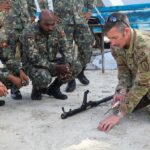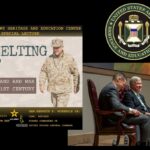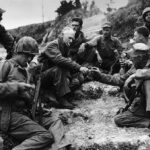
In an era where public trust in institutions has seen a sharp decline, the United States military has managed to maintain relatively high levels of public confidence. However, recent trends indicate a concerning decrease in this trust, raising questions about the future of civil-military relations. Ronald Krebs, a professor of political science at the University of Minnesota, joins host Carrie Lee to discuss the intricate relationship between the military and the public. Their conversation explores the factors contributing to this decline, the impact of political polarization, and the unique reverence Americans hold for their armed forces. And it echoes the theme of his most recent article Trump vs. the Military. It’s the latest episode in our Civil-Military Relations Center speaker series.
We need to stop venerating the military. We need to show them respect, but that’s not the same thing as blind veneration.
Podcast: Download
Subscribe: Apple Podcasts | Spotify | Amazon Music | Android | Pandora | iHeartRadio | Blubrry | Podchaser | Podcast Index | TuneIn | Deezer | Youtube Music | RSS | Subscribe to A Better Peace: The War Room Podcast
Ron Krebs is Distinguished McKnight University Professor and Professor of Political Science at the University of Minnesota. He is the author of the award-winning Narrative and the Making of US National Security (Cambridge UP, 2015) and is coeditor of the Oxford Handbook of Grand Strategy (Oxford UP, 2021), among other books. Krebs’ articles on a wide range of subjects in global affairs and international security have appeared in leading scholarly journals, including International Organization, International Security, and Security Studies, as well as in general interest outlets such as Foreign Affairs, Foreign Policy, The National Interest, and the Washington Post (for a complete list, see his website). Krebs is immediate past editor-in-chief of the leading scholarly journal Security Studies.
Carrie A. Lee is an associate professor at the U.S. Army War College, where she serves as the chair of the Department of National Security and Strategy and director of the USAWC Center on Civil-Military Relations. She received her Ph.D. in political science from Stanford University and a B.S. from MIT.
The views expressed in this presentation are those of the speakers and do not necessarily reflect those of the U.S. Army War College, U.S. Army, or Department of Defense.
Photo Description: New York denizens watch the Veterans Day Parade from the sidewalks of Fifth Avenue. Sailors are participating in Veterans Week New York City to honor the service of all our nation’s veterans.
Photo Credit: U.S. Navy photo by MC2 Andrew B. Church/Released





I find this podcast to be interesting in many aspects. Certainly, the civilian – military relationship is a very interesting and important norm that we must maintain within our republic. Trust is a key component of the civilian-military relationship and is an interesting topic as well.
Self-reflection and honesty are also interesting topics to me, and I find these topics to be largely absent from this conversation. Specifically, the actions of a former Chairman of the Joint Staff, General (retired) Mark Milley are not considered in this conversation, nor have they been discussed in any great detail as to how they may have affected the civilian – military relationship. It has been widely reported in the book Peril and in the work The Divider: Trump in the White House, that General (retired) Milley took these actions:
– Vowed to fight from the inside to undermine the first Presidency of President Trump https://thehill.com/homenews/administration/3592300-milley-vowed-to-fight-trump-from-the-inside-book-excerpt/
– Violated the chain of command by inserting himself in the procedure to fire nuclear weapons https://www.nbcnews.com/news/military/milley-acted-prevent-trump-misusing-nuclear-weapons-war-china-book-n1279187
– Contacted his peer in the Chinese military and stated that if the United States was going to strike China, he would give him a call “ahead of time.” https://nymag.com/intelligencer/2021/09/did-gen-milley-actually-go-rogue-at-end-of-trump-admin.html
– Referred to his Commander in Chief as a fascist https://www.theatlantic.com/newsletters/archive/2024/10/the-generals-warning/680279/
– Referred to President Trump as a “wannabe dictator” Gen. Mark Milley Remarks at Farewell Ceremony : CSPAN : October 1, 2023 7:06pm-7:31pm EDT : Free Borrow & Streaming : Internet Archive
I also find it interesting that the War Room is linking to an article that is disparaging of their new Commander in Chief, Trump versus the military. Certainly this behavior has raised my eyebrows.
The American people have born witness to the events of the last four years to include the aforementioned actions of General (retired) Milley, the botched withdraw from Afghanistan, and many, many other actions when they cast their vote.
When the American people spoke in November of 2024, President Trump won the Presidential election in a landslide. He is the first Republican to win the popular vote since 2004. President Trumps win also had coat tails in which the Republican party held the House of Representatives and took the majority in the Senate. The people have spoken in our republic, and they have chosen our Commander in Chief. Based on this I recommend our institution begin to look inward, be honest in its self-assessment and work to regain trust with our “new” Commander in Chief and the American people.
When a nation, and its military, are engaged in PREVENT political, economic, social and/or value change activities both at home and abroad, such as the U.S. was in the Old Cold War; then, in times such as these, should we not expect that the more conservative elements of these such nations — who owe their degree of power, influence, control, status, privilege, prestige, safety, security, etc., to the status quo — should we not expect that these such more conservative/these more no-change elements of a state and its society might view their military — who, like them, are fighting to prevent change — in a more favorable light? (The more liberal/the more pro-change elements of these states and societies, however, who had hoped to gain greater power, influence, control, etc., in these such times; these folks, understandably, not seeing their nation’s military — engaged in such PREVENT change activities — in such a favorable light?)
In sharp contrast, when a nation, and its military, are engaged in ACHIEVE political, economic, social and/or value change activities both at home and abroad, such as the U.S. has been in post-the Old Cold War; then, in times such as these, should we not expect that the more liberal elements of these such nations — who counted on achieving greater a greater degree of power, influence, control, status, privilege, prestige, safety, security, etc., in these such achieve change times — should we not expect these such more liberal/these more pro-change elements of a state and its societies would view now “their” military in a more favorable light? (In this such opposite case, with now the more conservative/the more-no change elements of these states and societies, thus threatened by both the “change” example and the “change” activities of their military, these folks, understandably, seeing their military now in a much less favorable light?)
Note: If we do not present our arguments and discussion in the proper “frame” — to wit: in the PREVENT political, economic, social and/or value change context of the Old Cold War — and in the ACHIEVE political, economic, social and/or value change context of the post-Cold War — then can we actually say that we are having a reasonable, understandable, and valid debate/discussion?
Addendum: Note that:
a. In the Old Cold War/PREVENT change scenario that I present immediately above, this is in relation to the political, economic, social and/or value changes demanded by the communists and communism back then. Whereas:
b. In the post-Cold War/ACHIEVE change scenario that I present immediately above, this in relation to the political, economic, social and/or value changes demanded by the capitalists — and capitalism, markets and trade — more recently.
Also to note that — with the election of President Trump for the second time — (a) the threat posed by the ACHIEVE change example and activities of our nation and our military, vis-a vis the no-change/reverse change-orientation and efforts of our great power challengers Russia and China, this may have been vastly diminished, (b) the threat posed by the ACHIEVE change example and activities of our nation and our military, vis-a-vis the no-change/reverse change-orientation and efforts of our lesser challengers Iran and Korea, this may have been vastly diminished, (c) the threat posed by the ACHIEVE change example and activities of our nation and our military, vis-a-vis the no-change/reverse change orientation and efforts of our non-state challengers like the Islamists, this may have been vastly diminished and (d) the threat posed by the ACHIEVE change example and activities of our nation and our military, vis-a-vis the no-change/reverse change orientation and efforts of our challengers here at home, this, also, may have been vastly diminished. (But at what cost?)
Note that, from the perspective that I provide immediately above, it appears that the U.S. — given the election of President Trump for the second time — has moved much closer to the PREVENT AND/OR ROLL BACK market-based political, economic, social and/or value change positions of such “enemy” entities as Russia, China, Iran, N. Korea, the Islamists, etc.; ALL OF WHOM it would seem — much like many Americans today — understandably feel/felt threatened by the political, economic, social and/or value changes demanded by (a) market society in the post-Cold War world and by (b) U.S./Western governments and militaries, who in the post-Cold War supported same.
The relevant questions, thus, which seem to surface from this such observation, these are:
a. What will the role of the U.S. military be in this new situation/in this new world, wherein, nearly everyone, everywhere, seems to be on the exact same PREVENT AND/OR ROLL BACK post-Cold War market-based/market society changes? And:
b. How will U.S. civil-military relations be effected by this such new situation/this such new world?
This discussion would have been more useful and it focused on the U.S. Military’s obligation to defend the constitution and how that impacts the U.S. Military’s relationship with civilian authority and the greater society. Most people do not understand this concept and do not realize how seriously it is taken with in the U.S. Military.
We had the former general and Secretary of Defense, Lloyd Austin, desert his post without telling any not once but twice. We have fat bottomed girls failing the gender neutral Army Combat Fitness Test but no one calls it out. No one acknowledges that women face disproportionate risks in combat. This lecture didn’t.
We have a former Chairman of the Joint Chiefs of Staff, now pardoned by Joe Biden, who secretly called China to warn them that Trump could start a war. We have a general say that President Trump requested 10,000 National Guard soldiers before Jan. 6, 2020 but it was not acted upon.
We have West Point remove “Duty, Honor, Country” from its motto and mission statement. No one resigned in protest. We have critical race theory defended by General Mark Milley in testimony to Congress. But no one protests that it is teaching logical fallacies.
Critical Race Theory in Six Logical Fallacies by Douglas Groothuis
https://www.nas.org/academic-questions/35/2/critical-race-theory-in-six-logical-fallacies
It appears that generals had a one year rotation through Afghanistan rather than remaining there for the duration. This was so that each general could build there resume.
No one resigned in disgrace after the disastrous retreat from Afghanistan. No one resigned in protest over the planned retreat.
What are the problems with our military?
The Rise of Wokeness in the Military by Thomas Spoehr
Director, Center for National Defense at the Heritage Foundation
https://imprimis.hillsdale.edu/the-rise-of-wokeness-in-the-military/
Intrinsic honesty and the prevalence of rule violations across societies
Simon Gächter 1 2 3 , Jonathan F Schulz 1 4
https://pubmed.ncbi.nlm.nih.gov/26958830/
Countries by IQ – Average IQ by Country 2022
https://worldpopulationreview.com/country-rankings/average-iq-by-country
Marine Corps Study: All-Male Combat Units Performed Better Than Mixed Units
September 10, 201512:00 PM ET
https://www.npr.org/sections/thetwo-way/2015/09/10/439190586/marine-corps-study-finds-all-male-combat-units-faster-than-mixed-units
Men and Women Seeing Different Failure Rates on Army’s Gender-Neutral Fitness Test
https://www.military.com/daily-news/2019/10/15/men-and-women-seeing-different-failure-rates-armys-gender-neutral-fitness-test.html
Women in combat roles face these “disproportionate medical risks”
https://hotair.com/jazz-shaw/2017/07/26/women-combat-roles-facing-disproportionate-medical-risks-n247525
The Genetic Lottery: Why DNA Matters for Social Equality by Kathryn Paige Harden
U.S. top general secretly called China over fears Trump could spark war -report By Reuters September 15, 2021
https://www.reuters.com/world/us/us-top-general-secretly-called-china-twice-trump-term-ended-report-2021-09-14/
Gen. Kellogg: Trump did request Nat’l Guard troops on Jan. 6th; asks Congress to release his testimony
https://americanmilitarynews.com/2022/08/gen-kellogg-trump-did-request-natl-guard-troops-on-jan-6th-asks-congress-to-release-his-testimony/
Duty, Honor, Outrage: Change to West Point’s mission statement sparks controversy
https://apnews.com/article/west-point-motto-mission-statement-duty-honor-27ab60e2ddbe165c885eead3324ea188